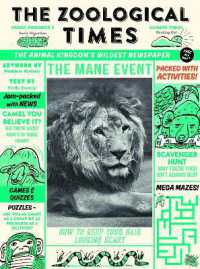Full Description
Presenting sixty theoretical ideas, David Zeitlyn asks 'How to write about anthropological theory without making a specific theoretical argument.'
"David Zeitlyn has written a wryly engaging, short book on, essentially, why we should not become theoretical partisans—that, indeed, being a serious theorist means accepting precisely that principle."—Michael Herzfeld, Harvard University
To answer, he offers a series of mini essays about an eclectic collection of theoretical concepts that he has found helpful over the years. The book celebrates the muddled inconsistencies in the ways that humans live their messy lives. There are, however, still patterns discernible: the actors can understand what is going on, they see an event unfolding in ways that are familiar, as belonging to a certain type and therefore, Zeitlyn suggests, so can researchers.
From the introduction:
This book promotes an eclectic, multi-faceted anthropology in which multiple approaches are applied in pursuit of the limited insights which each can afford.... I do not endorse any one of these idea as supplying an exclusive path to enlightenment: I absolutely do not advocate any single position. As a devout nonconformist, I hope that the following sections provide material, ammunition and succour to those undertaking nuanced anthropological analysis (and their kin in related disciplines).... Mixing up or combining different ideas and approaches can produce results that, in their breadth and richness, are productive for anthropology and other social sciences, reflecting the endless complexities of real life.
...This is my response to the death of grand theory. I see our task as learning how to deal with that bereavement and how to resist the siren lures of those promising synoptic overviews.
This book is relevant to anthropology, communication studies, cultural studies and sociology.
Contents
List of Figures
Acknowledgements
Introduction
60 Words To Think With
A. Affordance; Agnosia; Aporia; Archaeology; Argumentation theory; Autopoiesis; Axonometric projection
B. Bifocal ethnography; Blueprints, scores and maps; Boundary objects
C. Cabling; Catachresis; Chronotopes and chronotypes; Collage/montage; Colligation; Commitment
D. Dialetheism/paraconsistency
E. Ekphrasis;Emic and etic; Epistemography; Epiphanies; Equifinality; Equivocation (controlled equivocation);. Essentially contested concepts; Exaptation;. Exemplars
F. Faithfulness; Figuration; Finitism; meaning finitism; Forbearing and 'subjective counterfactuals'
H. Hapax; Hesse Nets
I. Incommensurability; Infirming; Instauration; Ironic detachment; Irrealism; Isolarion
L. Life writing
M. Mosaics
N. Non-ergodicity
O. Ostension
P. Palimpsest memory; Partial views and partiality; Pattern language; Paraethnography; Positioning theory; Prosopography
R. Repleteness; Representation/non-representation; Representational force
S. Sgraffiti; Stochastic variation; Synaesthesia
T. Teleoanalysis; Things; Translation (anthropological translation)
V. Vagueness; Vignettes
W. Wicked problems
Coda: So What? A Worked Example of Making Sense of Ethnographic Fragment
Index








